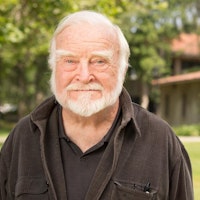Flow helps to integrate the self because in that state of deep concentration consciousness is unusually well ordered.
Mihaly Csikszentmihalyi

To Integrate the Self
Topic: Self-Cultivation & Health
Flow helps to integrate the self because in that state of deep concentration consciousness is unusually well ordered. Thoughts, intentions, feelings, and all the senses are focused on the same goal. Experience is in harmony. And when the flow episode is over, one feels more ‘together’ than before, not only internally but with respect to other people and the world in general.
Mihály Csíkszentmihályi was born on September 29, 1934, in Fiume, Italy (now Rijeka, Croatia). Growing up during World War II, he experienced the hardships of the era, including being imprisoned as a child in Italy. These early experiences shaped his interest in understanding what makes life meaningful. At 22, after completing his secondary education in Rome, he immigrated to the United States and pursued psychology at the University of Chicago, where he earned both his B.A. in 1959 and his Ph.D. in 1965.
Csíkszentmihályi is best known for his concept of "flow," the state of complete immersion in an activity, often experienced during creative or challenging tasks. His interest in psychology began after hearing Carl Jung speak, which led him to explore the psychological aspects of creativity and happiness. His research showed that people often found fulfillment not from the outcome of their work but from the process itself. His book Flow: The Psychology of Optimal Experience (1990) became a key work in the study of human well-being.
Throughout his career, Csíkszentmihályi’s work contributed to the field of positive psychology, focusing on how people can lead more fulfilling lives. His studies, including the well-known "Experience Sampling Study," demonstrated that people were happier when engaged in tasks that challenged them just enough. Csíkszentmihályi authored many books and articles on creativity and happiness, leaving behind a legacy that continues to inspire people to find meaning in their daily activities. He passed away on October 20, 2021.
Flow: The Psychology of Optimal Experience
Csíkszentmihályi, Mihály. Flow: The Psychology of Optimal Experience. Harper & Row, 1990, p. 41.

Mihaly Csikszentmihalyi
Theme: Being in Self

About This Mihály Csíkszentmihályi Quotation [Commentary]
“Mihály Csíkszentmihályi states, “Flow helps to integrate the self because in that state of deep concentration consciousness is unusually well ordered.” In this ordering, “thoughts, intentions, feelings, and all the senses are focused on the same goal.” Attention gathers; distractions recede. Because “consciousness is unusually well ordered,” activity and awareness meet, and the self clarifies without being erased.
From this ordered attention, “experience is in harmony.” The task becomes the place where skill and challenge align, and the person—of any gender or background—acts with undivided focus. When “all the senses are focused on the same goal,” the self functions as a whole; action feels precise, meaningful, and steady because inner experience is synchronized around a clear aim.
Csíkszentmihályi names the outcome plainly: after the episode, one feels “more ‘together’ than before, not only internally but with respect to other people and the world in general.” This is a practical rhythm of Being In Self: deep concentration orders consciousness, “experience is in harmony,” and the integrated person returns to life more available to relate, create, and serve—“more ‘together’” with oneself and with the wider world.
The Perennial Relevance of Mihály Csíkszentmihályi’s Flow Theory
Flow theory, developed by Mihály Csíkszentmihályi, remains highly relevant in positive psychology, especially in light of recent findings that connect flow to meditative practices. Both flow and meditation are characterized by decreased activity in the prefrontal cortex, which reduces self-reflective thinking and allows for a sense of immersion and loss of self-consciousness. Studies on the Default Mode Network (DMN) suggest that, in both states, there is less mind-wandering and a heightened focus on the present moment. This overlap in brain activity shows how both flow and meditation promote well-being by helping individuals achieve a deeply engaged, attentive state. While flow often occurs during active engagement in tasks and meditation is more deliberate, their shared neurological basis highlights their potential for enhancing focus, creativity, and life satisfaction.
Additional Mihály Csíkszentmihályi Quotations
Resources
Related Quotes
Copyright © 2017 – 2026 LuminaryQuotes.com About Us